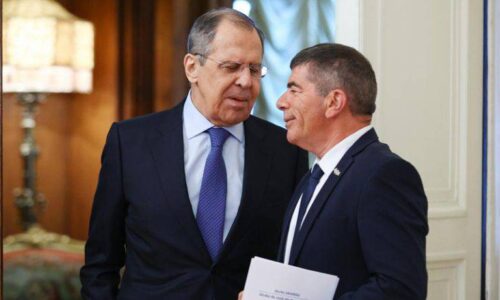
Would Russia and Israel cooperate to neutralize Hezbollah terrorist group in Syria?
Two delegations, one Lebanese and one Israeli, visited the Russian capital Moscow in March 2021. Each separately discussed recent developments in the Middle East and the purposes of the recurrent Israeli attacks on military sites in Syria.
The two visits; the corresponding meetings; and the discussions’ outcomes have been thoroughly analyzed to answer a set of questions, all related to Iran and its presence in Syria. Observers sought clues as to the Iranian forces and Iranian-backed Hezbollah forces deployed in Syria, and whether these forces will opt for a retreat or not?
On 15 March, a Hezbollah delegation visited Moscow, answering a Russian invitation. Over the three-day visit, the delegation had meetings at the Russian Foreign Ministry, the Federal Council, and the State Duma (Parliament).
The delegation comprised the party’s Arab and international relations officer Ammar al-Moussawi, his aide for international affairs Ahmed Mehani, and the media advisor Ahmed Hajj Ali, as well as the head of Hezbollah’s Loyalty to Resistance bloc, MP Mohammed Raad.
The Russian Foreign Ministry made a statement on 15 March, saying that the discussion addressed recent developments in Lebanon, Syria, and the Middle East.
The ministry added that views were exchanged on the comprehensive settlement process in Syria and that Moscow reaffirms its commitment to the Syrians’ right to self-determine their own future in line with UN Security Council Resolution 2254.
Prior to the visit, the Russian Sputnik News Agency interviewed MP Mohammed Raad. He said that the invitation he received seeks to “reopen the discussion on the prospects of the upcoming phase after accomplishments were made in the interest of the peoples of the region [Middle East] in the past phase.”
Raad added that “The relationship between [Hezbollah] and Russia started many years ago. It is governed by common interests and concerns, as well as a close perspective on the situation in the region and the necessity to help it achieve stability, so that peoples can utilize the blessings of the countries where they live or to which they belong.”
On 16 March, however, the Russian News Agency TASS spoke of an “undeclared purpose” for the visit. The agency reported that Hezbollah was attempting to know whether the Russian position towards the head of the Syrian regime, Bashar al-Assad, has changed recently, particularly after the meeting that brought the Russian foreign minister with counterparts from several countries that oppose al-Assad’s stay in power.
The agency quoted Russian International Affairs Council expert Anton Mardasov, as saying that “Russia apparently seeks to bring the Syria issue back on the diplomatic track.”
“Hezbollah’s visit, as well as the efforts to step up the activities of the Russia-Turkey-Qatar group, do not seem random,” the expert added.
Anadolu Agency covered a joint press conference of the Russian foreign minister and his Israeli counterpart, Gabi Ashkenazi. The agency quoted the latter as saying that his country would not allow Iran to use the Syrian file to harm the interests of Tel Aviv.
Ashkenazi added that “Israel maintains the right to defend itself, and that his country will do everything necessary to protect its security and vital interests.”
In an interview with TASS, the Israeli foreign minister said that Iran is stepping up the transfer of weapons to Syria, to use the country as a platform for its operations against Israel.
Minister Ashkenazi noted that the transferred weapons include missiles, adding that Israel does not accept this.
He also stressed that it is necessary for all Iranian military groups to withdraw from Syria.
He said that Israel is concerned with Syria that is stable, responsible, and sovereign. But Israel cannot and should not allow Iranian forces to be deployed along the border with Syria, even at a distance of 80 miles or several kilometers.
Minister Ashkenazi attributed the Israeli attacks in Syria to Iran. He added that if it were not for the Iranian forces in Syria, Israel would not have carried out military operations and that such attacks will continue as long as Iranian forces remain in Syria.
In 2021 alone, Israel carried out seven airstrikes against military sites across Syria, belonging to Syrian regime forces, Iranian militias, and the Lebanese Hezbollah.
He justified the recurrent airstrikes on military sites in Syria to the fact that Iranians have grown quite experienced with using weapon supply lines to provide Iranian and Hezbollah forces in Syria with advanced weapons systems, adding that this is “unacceptable.”
On 13 March, the Lebanese Janoubia website quoted Samir Ayoub, Saint Petersburg-based expert on Russian affairs, that the official talks between the Hezbollah delegation and Russian officials will focus on the situation in Syria.
The expert added that the discussions will also approach the possibility of relocating Hezbollah forces in Syria, to help reduce tension in the region given the ongoing Israeli airstrikes in Syria.
Quoting unnamed sources in Tel Aviv, Asharq Al-Awsat newspaper reported on 18 March that Russia agreed with Israel to stop Iran’s deployment in Syria and prevent the leaking of heavy and high precision weaponry into the hands of Hezbollah in Lebanon.
The newspaper described the agreement as “a Russian project to establish new arrangements in Syria that take Israeli interests into account.”
According to the newspaper, the sources said that the Russian Foreign Minister, Sergey Lavrov, called on Israel to provide Russia with the relevant information when threats are detected to act ahead of airstrikes on targets in Syria.
For its part, the Israeli newspaper Maariv said that Moscow wants to be alone in Syria after it obtained access to the Mediterranean water, as it does not want Iran or Hezbollah, or even Turkey there.
The newspaper said that Israel is looking forward to conducting diplomatic initiatives through Russia.
Source: En Abbaladi





